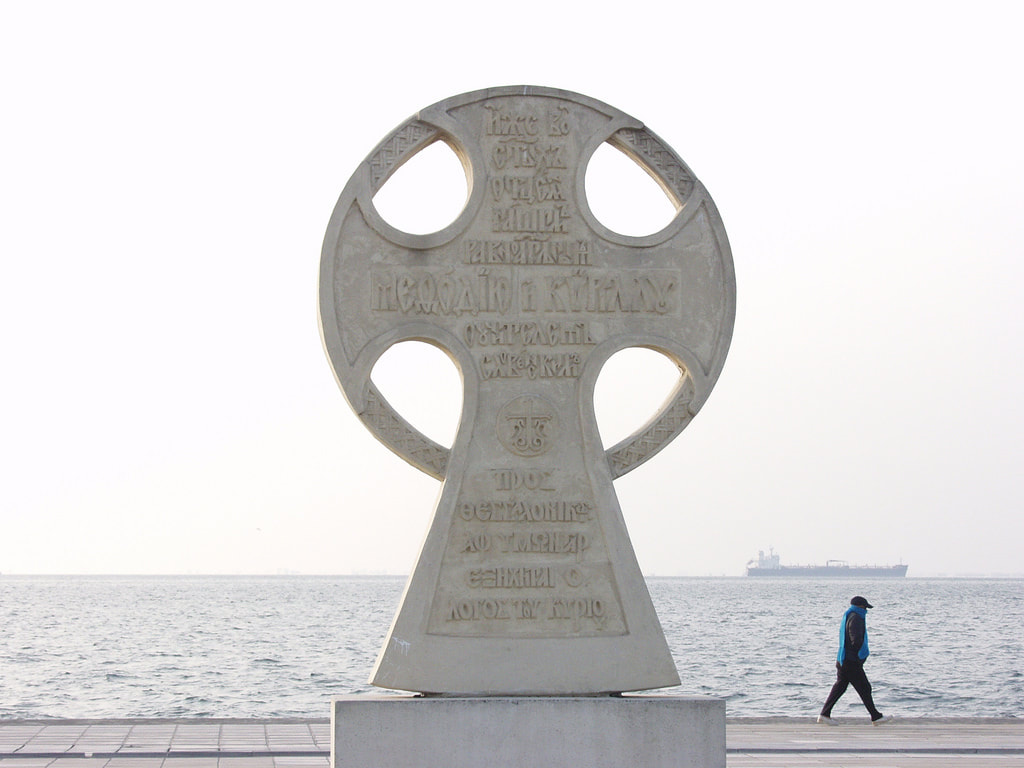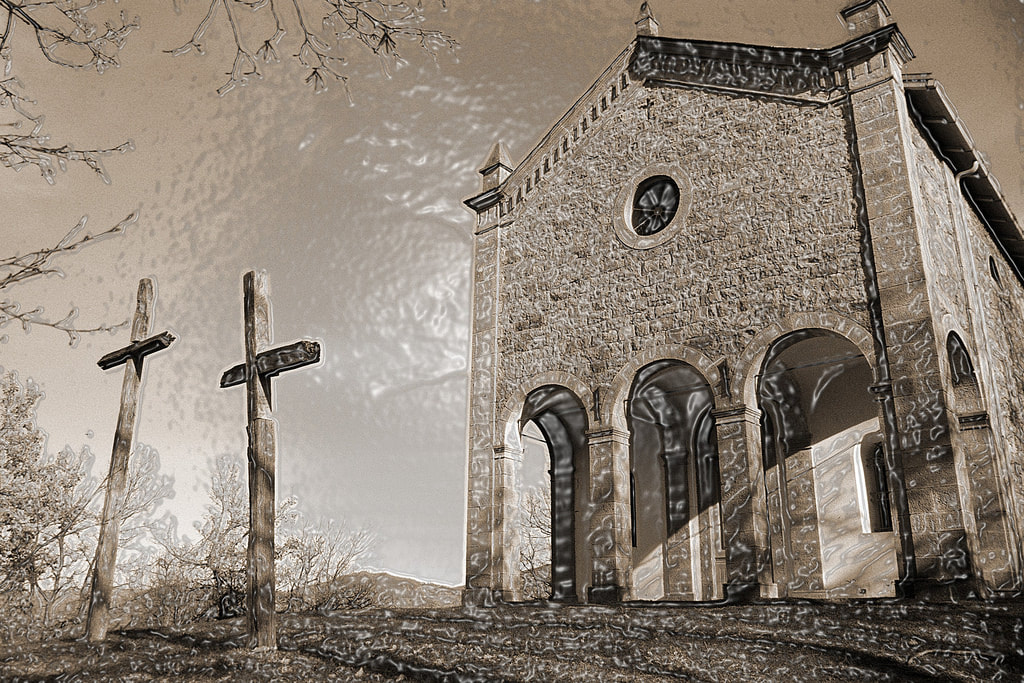Is it alright to be an orthodox Christian but
with leanings toward process theology?
response by Rev. Teri Daily, Christian Priest
Dear Reverend Daily,
I am a great admirer of your essays in Open Horizons, and I feel called to Christian ministry, just like you. And, like you, I’m drawn to some aspects of process theology, but not to all aspects. Like you, I believe in creation-ex-nihilo. I had a meeting the other day with my discernment team. I casually spoke of myself as “generously orthodox with process leanings” and one person teasingly said, “Forget the process part.” (I am not Episcopalian. I’m Methodist, by the way.) I was a little stunned by his response, but I recognize that he had an image of process thought that was different from mine. He thought it was all about metaphysics where I think it’s about the kinds of things you emphasize in “What an Orthodox-oriented Christian learns from process theology.” Can you advise me on how I should have responded to him or might do so in the future? I want to claim both sides of my life: the orthodox and the process.
Thanks,
Rebecca
Dear Rebecca,
It is great to hear from someone who believes that an orthodox Christian can be open to, and enriched by, other understandings of God. The very fact that you describe yourself as “generously orthodox with process leanings” leads me to suspect that you believe diversity makes the world richer and more beautiful. I do, too.
Some Christians – like the one who serves on your discernment committee – think that an appreciation for process theology is incompatible with an orthodox understanding of Christianity. After all, process theology and orthodox Christianity have different models for God – a dipolar God with both temporal and eternal aspects, and a Trinitarian God who has become incarnate in Jesus of Nazareth. Each model gives rise to its own theological language. And, yet, if we move beyond models and vocabulary, we can see that these two theologies share some key understandings of God’s relationship with the world. Perhaps some of these shared concepts would be a good start to your conversation with the friend on your discernment committee. Here are a few you could mention.
Both process theology and classical Christianity believe in a God who is intimately involved in the world. For process theologians, God is part of every experience – offering new possibilities, inviting us to choose the best of the options before us, feeling our every feeling, and taking our past experiences into God’s very being. Classical Christianity portrays our participation in God through images and doctrines – God’s covenant with Israel and the Church, the union of God and creation in the Incarnation, the assumption of humanity into the life of God through the ascension, and the Holy Spirit at work and prayer within us. In both process theology and traditional Christianity, we participate in God’s life, and God participates in ours.
Both theologies understand God’s creative work in the world to have the character of gift. Creation ex nihilo or creation “out of nothing” is the classical Christian understanding of how the world came to be. It is perhaps the most dramatic expression of God’s gracious gift-giving and prevenient grace that there is; our existence is pure gift, as is the “new life” we experience in Christ. While those who subscribe to a process view of the world do not believe in creation ex nihilo, God’s creativity still shapes the world and brings new possibilities into being, possibilities that would not exist were it not for God. Novelty – new life – is always a gift from God.
Finally, both process theology and orthodox Christianity believe in the primacy of God’s love. When faced with the dilemma of how God can be both all-loving and all-powerful in a world where there is evil, process theologians choose love over power: God is all-loving but not all-powerful. Non-process Christians also embrace love as the supreme attribute of God. But many also believe in God’s simplicity: God is not composed of parts, and God’s attributes are not distinct from God’s essence. In other words, God doesn’t have love, mercy, beauty, goodness, etc.; God is love, mercy, beauty, goodness, etc. This means that God’s power is never separated from God’s love; to be all-powerful is to be all-loving – a very different understanding of power than those often found in our world today.
These and other shared concepts can lead to shared attitudes, values, and practices as well. Process theology becomes more than a metaphysical model, and Christianity becomes more than a set of doctrines. Perhaps this broader view of theology would be helpful in the conversation with your friend, Rebecca.
Of course, to stay on the level of similarities would to miss out on enriching differences. Some things truly are more explicit, accessible, or present in process theology than in an orthodox understanding of Christianity – such as an aversion to dogmatic certainty, an embrace of curiosity and imagination, and a God whose characteristics are more consistent with the revelation of God in Jesus than are the depictions of God in some forms of Christianity.
Whether or not the friend on your discernment team approves of your process leanings, keep your heart open to the Holy Spirit at work in other concepts of God. Celebrate shared ideas, attitudes, values, and practices; listen deeply to differences. To do otherwise is to give into the fear of difference, to make an idol of our own concept of God, and to close ourselves off from possible avenues of God’s creative and transforming work in our lives.
Peace on your journey, Rebecca.
Teri
I am a great admirer of your essays in Open Horizons, and I feel called to Christian ministry, just like you. And, like you, I’m drawn to some aspects of process theology, but not to all aspects. Like you, I believe in creation-ex-nihilo. I had a meeting the other day with my discernment team. I casually spoke of myself as “generously orthodox with process leanings” and one person teasingly said, “Forget the process part.” (I am not Episcopalian. I’m Methodist, by the way.) I was a little stunned by his response, but I recognize that he had an image of process thought that was different from mine. He thought it was all about metaphysics where I think it’s about the kinds of things you emphasize in “What an Orthodox-oriented Christian learns from process theology.” Can you advise me on how I should have responded to him or might do so in the future? I want to claim both sides of my life: the orthodox and the process.
Thanks,
Rebecca
Dear Rebecca,
It is great to hear from someone who believes that an orthodox Christian can be open to, and enriched by, other understandings of God. The very fact that you describe yourself as “generously orthodox with process leanings” leads me to suspect that you believe diversity makes the world richer and more beautiful. I do, too.
Some Christians – like the one who serves on your discernment committee – think that an appreciation for process theology is incompatible with an orthodox understanding of Christianity. After all, process theology and orthodox Christianity have different models for God – a dipolar God with both temporal and eternal aspects, and a Trinitarian God who has become incarnate in Jesus of Nazareth. Each model gives rise to its own theological language. And, yet, if we move beyond models and vocabulary, we can see that these two theologies share some key understandings of God’s relationship with the world. Perhaps some of these shared concepts would be a good start to your conversation with the friend on your discernment committee. Here are a few you could mention.
Both process theology and classical Christianity believe in a God who is intimately involved in the world. For process theologians, God is part of every experience – offering new possibilities, inviting us to choose the best of the options before us, feeling our every feeling, and taking our past experiences into God’s very being. Classical Christianity portrays our participation in God through images and doctrines – God’s covenant with Israel and the Church, the union of God and creation in the Incarnation, the assumption of humanity into the life of God through the ascension, and the Holy Spirit at work and prayer within us. In both process theology and traditional Christianity, we participate in God’s life, and God participates in ours.
Both theologies understand God’s creative work in the world to have the character of gift. Creation ex nihilo or creation “out of nothing” is the classical Christian understanding of how the world came to be. It is perhaps the most dramatic expression of God’s gracious gift-giving and prevenient grace that there is; our existence is pure gift, as is the “new life” we experience in Christ. While those who subscribe to a process view of the world do not believe in creation ex nihilo, God’s creativity still shapes the world and brings new possibilities into being, possibilities that would not exist were it not for God. Novelty – new life – is always a gift from God.
Finally, both process theology and orthodox Christianity believe in the primacy of God’s love. When faced with the dilemma of how God can be both all-loving and all-powerful in a world where there is evil, process theologians choose love over power: God is all-loving but not all-powerful. Non-process Christians also embrace love as the supreme attribute of God. But many also believe in God’s simplicity: God is not composed of parts, and God’s attributes are not distinct from God’s essence. In other words, God doesn’t have love, mercy, beauty, goodness, etc.; God is love, mercy, beauty, goodness, etc. This means that God’s power is never separated from God’s love; to be all-powerful is to be all-loving – a very different understanding of power than those often found in our world today.
These and other shared concepts can lead to shared attitudes, values, and practices as well. Process theology becomes more than a metaphysical model, and Christianity becomes more than a set of doctrines. Perhaps this broader view of theology would be helpful in the conversation with your friend, Rebecca.
Of course, to stay on the level of similarities would to miss out on enriching differences. Some things truly are more explicit, accessible, or present in process theology than in an orthodox understanding of Christianity – such as an aversion to dogmatic certainty, an embrace of curiosity and imagination, and a God whose characteristics are more consistent with the revelation of God in Jesus than are the depictions of God in some forms of Christianity.
Whether or not the friend on your discernment team approves of your process leanings, keep your heart open to the Holy Spirit at work in other concepts of God. Celebrate shared ideas, attitudes, values, and practices; listen deeply to differences. To do otherwise is to give into the fear of difference, to make an idol of our own concept of God, and to close ourselves off from possible avenues of God’s creative and transforming work in our lives.
Peace on your journey, Rebecca.
Teri

